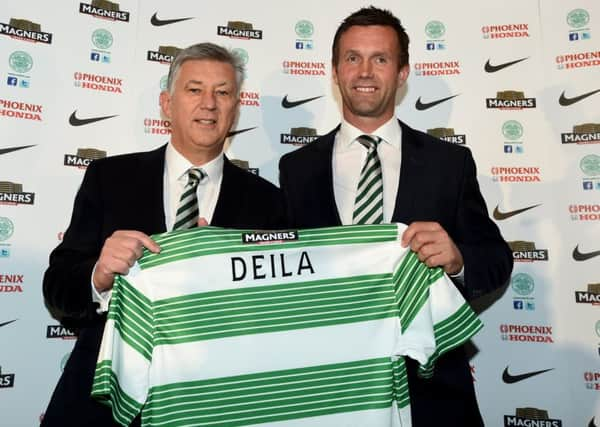Andrew Smith: Celtic suffer seven-year glitch


The direction of travel at Celtic – despite the Barcelona win of 2011 and all that – was questionable long before the Norwegian pitched up from six years managing, effectively, the Motherwell of Norway.
Celtic’s hierarchy are fond of their number crunching and value getting the “financial fundamentals” correct. As is right and proper. Yet, they should perhaps chew on this set of figures.
Advertisement
Hide AdAdvertisement
Hide AdIn the past seven years they have appointed three managers, Tony Mowbray, Neil Lennon and Ronny Deila. You can ask serious questions of the thinking behind each one of these. Lennon may have prospered, but many of us would stand by the assertion that, if pitching at the level Celtic should be, the club should not offer any individual his start in senior management.
In the past seven years Celtic have made two appearances in the Champions League. One of these was the scrawniest of entries, with only the goal frame saving them from a Champions League qualifying exit against one of their most ordinary ever European opponents, Shakhter Karagandy, in 2013.
In the past seven years Celtic have come off second best on the field in five European qualifiers against teams with a fraction of their resources. Good fortune and not good judgement meant only three of these were against sides that followed the rules.
In the past seven years Celtic have spent £60 million more than any other Scottish club on their football-department spend. Assuming they clinch their fifth consecutive title in the coming weeks, in that time they have will have won only eight of the 21 competitions they have contested.
In the past seven years Celtic have signed 80 players. Being highly generous, their strike rate on this battalion of arrivals – a fair number loan recruited – is one in three. The club are to be applauded for being around £35m in profit on their comings and goings over that period. Yet, the fact is roughly £15m of that has been squandered on transfer fees and wages for players who have offered no value on or off the pitch.
Celtic are not the only club capable of triumphing in the top flight by accident. They are derided for winning a one-horse race but the league only became that because they have paid their way and got so much right in that respect when Rangers got so much wrong.
Chief executive Peter Lawwell and major shareholder Dermot Desmond have been the driving forces in an approach that could yet yield a record run of titles, and which ensures Celtic have enviable financial stability.
It is not the fault of the Celtic board that the club are diminished simply by their environment and proximity to a riches-beyond-comprehension set-up south of the border.
Advertisement
Hide AdAdvertisement
Hide AdYet that does not explain away the growing issues over the club’s stewardship. Some of these, indeed, are in the political domain. The failure to become an accredited living wage employer and the preponderance of board members with unapologetic right-wing agendas feels firmly at odds with an organisation that tended to be, let’s say, old Labour in outlook. By which is meant that John Reid and Jim Murphy no more embody the heart of Celtic than any Tory peer.
That matters, but not as much as the influences to be felt in the shaping of player recruitment. The impression, rightly or wrongly, is that three, practically, competing influences feed into it. It appears the manager, the scouting department and the chief executive through other contacts provide recommendations and have their picks. Where that has led is a squad with 18 midfielders and only one striker that could be trusted to provide a potent threat. There must be a better way. And, whether he likes it or not, the right signals are hardly sent out by Lawwell’s remuneration being in the region of seven figures to outstrip the current manager’s wage by around three-to-one.
Football comes down to instincts. Desmond has told the story of how, after the club agreed terms with Guus Hiddink in May 2000, he stopped any paperwork being signed until he met with the Dutchman so that he could “look into the whites of his eyes” and tell if his pursuit of the Celtic manager’s job was owed to more than financial considerations.
The Irish businessman looked, and decided it wasn’t, a genius decision with Martin O’Neill the man he pursued. Now, there are plenty who would gaze on his pupils, and those of Lawwell, and wonder if their footballing focus has become diluted or diffused by the straitened circumstances that surround their club.